Münster police search for motive of driver who killed himself after ploughing vehicle into crowd

Police in Germany were on Sunday morning trying to make sense of why a 48-year-old local man with no known links to terrorism drove a minivan into a crowded open-air restaurant terrace, killing two people before shooting himself dead.
Although the perpetrator has not been officially named, he has been identified locally as Jens R, a German citizen born about an hour south of the city of Münster, where the attack took place.
“So far there are no indications of a possible motive. The investigation is being conducted at full speed and in all directions,” Martin Botzenhardt of the local prosecutor’s office said.
Authorities are believed to have all but ruled out Islamist extremism as a motive, after establishing Jens R had no links to the Islamist scene.
Instead they are said to be working on the theory the attack may have been a form of “extended” suicide.
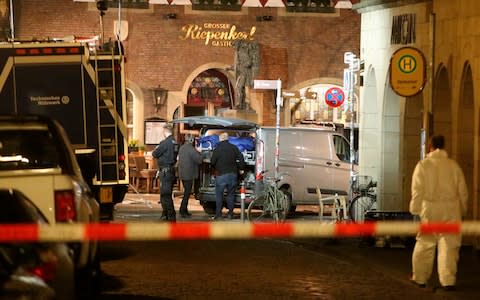
Jens R is believed to have had a history of mental illness, and had reportedly made an earlier attempt at suicide. He also reportedly spoke of committing suicide in a “spectacular” manner.
Complicating matters further, he is also said to have had links with the German far-Right scene, though it is not clear how close these alleged links were. According to some reports he had been in touch with far-Right groups over the internet, but was not politically active.
He was also reportedly known to police for a number of petty crimes, such as stealing cell phones and car radios.
Police have now ruled out earlier reports of two possible accomplices escaping from the minivan at the scene of the attack.
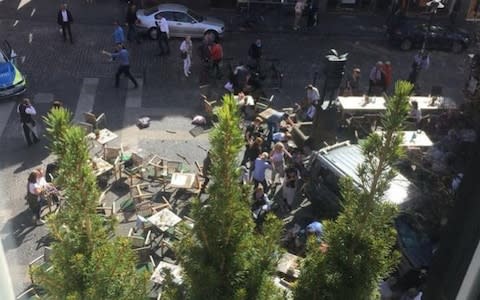
Explosives teams were called in overnight to defuse what was at first feared to be a booby trap in the minvan, but it turned out to be fireworks.
A second gun was also found inside the car. A search of Jens R’s flat uncovered a Kalashnikov assault rifle, but it had been deactivated and was unable to fire.
The two people killed in the attack were both German. They were identified on Sunday as a 65-year-old man from Borken, about an hour west of Münster, and a 51-year-old woman from Lüneburg, 180 miles to the north.
Around 20 people were injured in the attack, and several were still in critical condition on Sunday morning according to the authorities.
Who was the driver?
Police said the driver, named locally as 48-year-old German national Jens R, shot himself dead after ramming into the crowd.
According to a report by Süddeutsche Zeitung, the German newspaper, he had a history of mental health issues.
Münster locator
What happened?
A van ploughed into people sitting outside on a warm afternoon in Münster, crashing into tables outside of the Grosser Kiepenkerl restaurant in the historic centre of the city. The restaurant is a popular tourist attraction in the picturesque city of 300,000 residents.
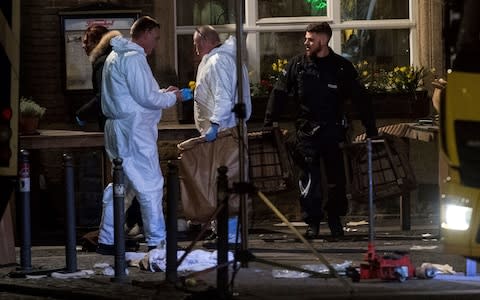
Lino Baldi, who owns an Italian restaurant in Münster near the scene of the crash, told Sky TG24 that the city centre was packed due to a Saturday market and summer-like temperatures.
The vehicle struck at 3.27pm as tourists and students basked in the sunshine.
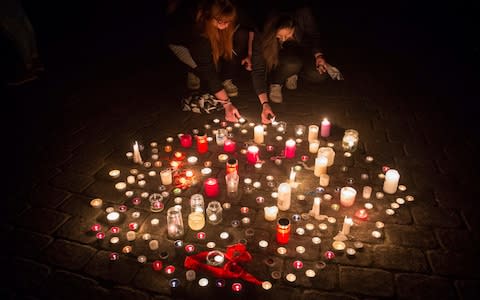
A witness told Germany's NTV: "There was a bang and then screaming. The police arrived and got everyone out of here. There were a lot of people screaming. I'm angry, it's cowardly to do something like this."
German President Frank-Walter Steinmeier said: "This was a serious act of violence. My deep sympathy goes to all those who have lost a loved one."
Münster is a city in North Rhine-Westphalia, to the west of Germany near the border with the Netherlands. Around a fifth of the population are students, and there are four universities within the city. It is also known as the bicycle capital of Germany.
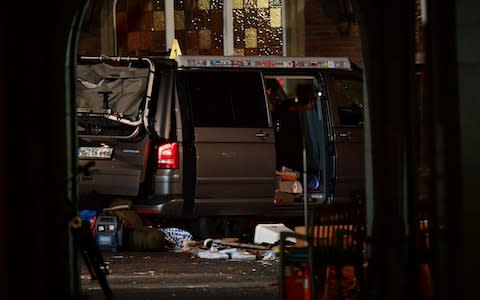
A spokeswoman for German Chancellor Angela Merkel said "our thoughts are with the victims and their families" who were killed and injured in the incident.
Spokeswoman Ulrike Demmer on Twitter called the crash Saturday "terrible news."
Katarina Barley, the German justice minister, added: "We must do everything to clarify the background of the incident."
Markus Lewe, the city's mayor, said the motive was unclear.
Let’s not jump to conclusions, but this doesn’t sound like a simple accident to me. https://t.co/SkjPZzFnoq
— Donald Trump Jr. (@DonaldJTrumpJr) April 7, 2018
He added: "All of Münster is mourning this horrible incident. Our sympathy is with the relatives of those who were killed. We wish the injured a quick recovery. At this point we don’t know the background to the incident."
The Foreign and Commonwealth Office confirmed that they are in touch with local authorities in Germany and "stand ready to assist any British nationals who may be affected."
Timeline of vehicle rampage attacks in Europe
Vehicle attacks in Europe
The incident happened on the one-year anniversary of a truck attack in Stockholm that killed five people and seriously injured 14 others.
Germany has experienced a number of terrorist attacks in recent years, including through the deadly use of vehicles.
In December 19, 2016, Tunisian national Anis Amri, 24, hijacked a truck and slammed it into a crowd of people at a Christmas market in Berlin, killing 12 people and injuring 48.
Amri was shot dead by Italian police in Milan four days later after travelling through several European countries. Islamic State of Iraq and the Levant (Isil) claimed responsibility for that attack.
Isil also claimed several similar attacks in Europe, including a rampage along Barcelona's Las Ramblas boulevard in August 2017 that killed 14 and left more than 100 injured.
The deadliest such incident in recent years was in the French resort city of Nice in 2016, where a man rammed a truck into a crowd on France's national July 14 holiday, killing 86 people.
